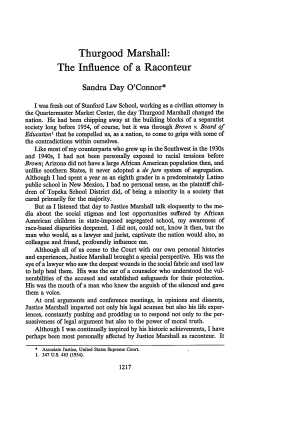By Justice Sandra Day O'Connor
Thurgood Marshall: The Influence of a Raconteur
June 1992

Reprinted in 1992 J. Sup. Ct. Hist. 1 (1992)
DISCLAIMER: This text has been transcribed automatically and may contain substantial inaccuracies due to the limitations of automatic transcription technology. This transcript is intended only to make the content of this document more easily discoverable and searchable. If you would like to quote the exact text of this document in any piece of work or research, please view the original using the link above and gather your quote directly from the source. The Sandra Day O'Connor Institute does not warrant, represent, or guarantee in any way that the text below is accurate.
Article Text
(Excerpt, Automatically generated)
Thurgood Marshall:
The Influence of a Raconteur
Sandra Day O'Connor*
I was fresh out of Stanford Law School, working as a civilian attorney in the Quartermaster Market Center, the day Thurgood Marshall changed the nation. He had been chipping away at the building blocks of a separatist society long before 1954, of course, but it was through Brown v. Board of Education1 that he compelled us, as a nation, to come to grips with some of the contradictions within ourselves.
Like most of my counterparts who grew up in the Southwest in the 1930s and 1940s, I had not been personally exposed to racial tensions before Brown; Arizona did not have a large African American population then, and unlike southern States, it never adopted a de jure system of segregation. Although I had spent a year as an eighth grader in a predominately Latino public school in New Mexico, I had no personal sense, as the plaintiff chil dren of Topeka School District did, of being a minority in a society that cared primarily for the majority.
But as I listened that day to Justice Marshall talk eloquently to the me dia about the social stigmas and lost opportunities suffered by African American children in state-imposed segregated school, my awareness of race-based disparities deepened. I did not, could not, know it then, but the man who would, as a lawyer and jurist, captivate the nation would also, as colleague and friend, profoundly influence me.
Although all of us come to the Court with our own personal
